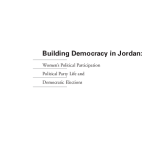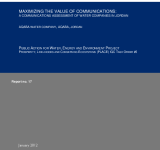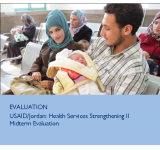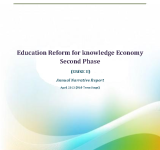evaluation
يعد هذا التقرير حول التطور الديمقراطي في الأردن، واحدًا من أهم التقارير التي تمخض عنها مشروع الديمقراطية في العالم العربي الذي نفذته المؤسسة الدولية للديمقراطية والانتخابات بالتعاون مع شبكة المنظمات
The report is based on the study designed to conduct a communications assessment of Aqaba Water Company;; one of the key water utilities in Jordan and to examine how its communications department collaborates with other areas of the organization. As part of the Public Action for Water;; Energy and Environment Project (PAP);; a public education and behavior change communication program developed to support USAID’s technical and policy investments in the Jordanian water and energy sectors;; the report finds that the effective communications can save the utility money by improving operations;; increasing efficiencies and reducing customer complaints. The report suggests that the strategic communications can be the key to a sustainable future for the kingdom during the times of critical resource constraints and presents some guiding principles and recommendations for the Aqaba Water Company’s communication efforts.
The report presents the findings;; conclusions and recommendations of a midterm evaluation of Health Systems Strengthening (HSS) II;; a five year (2009-2014);; $73 million USAID-funded project. The strategy of the HSS II is to institutionalize strengthened health systems in support of reduced fertility rates and improved women's health. It works with the public health sector;; namely the Ministry of Health;; the Royal Medical Service and the Jordan University Hospital. The report finds that the project has met 13 of its 23 targets for year 3 and is on track to meet all its objectives by the end of the project. Expected results are public sector initiatives in safe motherhood and reproductive health. The HSS II project;; with its close ties with the Ministry of Health for its responsiveness to health needs and integrated approach to health delivery;; has strengthened critical health systems through its support to health management information system;; renovations;; accreditation;; referrals and capacity-building. The report recommends the USAID to negotiate the removal of a requirement that midwives be supervised intrauterine device insertion;; advocate for innovative incentive schemes and varying salary grades that reward midwives and doctors providing FP services and revise project indicators to reflect health outcomes and impact. Further recommendations include continuing support of a broad-scale mass media behavior change and communication campaign and programs that build on gains in maternal and neonatal health.
The second phase of the Program Education Reform for the Knowledge Economy Program (ERfKE II) continues to build on the achievements of the first phase and follow the same implementation arrangements that have proven to be successful in (ERfKE I);; and in the same time;; focuses on schools as the locus of change as well as on the need to enhance capacity building at the central and field levels. The development objective of (ERfKE II) is to provide students enrolled in pre-tertiary education institutions in Jordan with increased levels of skills to participate in knowledge economy. Also the Mid-Term review highlighted the concrete progress achieved by (ERfKE II) in several key areas related to policy development;; quality of education interventions and school construction;; and identified the key issues as a summary of the overall progress that will be tackled and addressed during the remaining stage of implementation.



